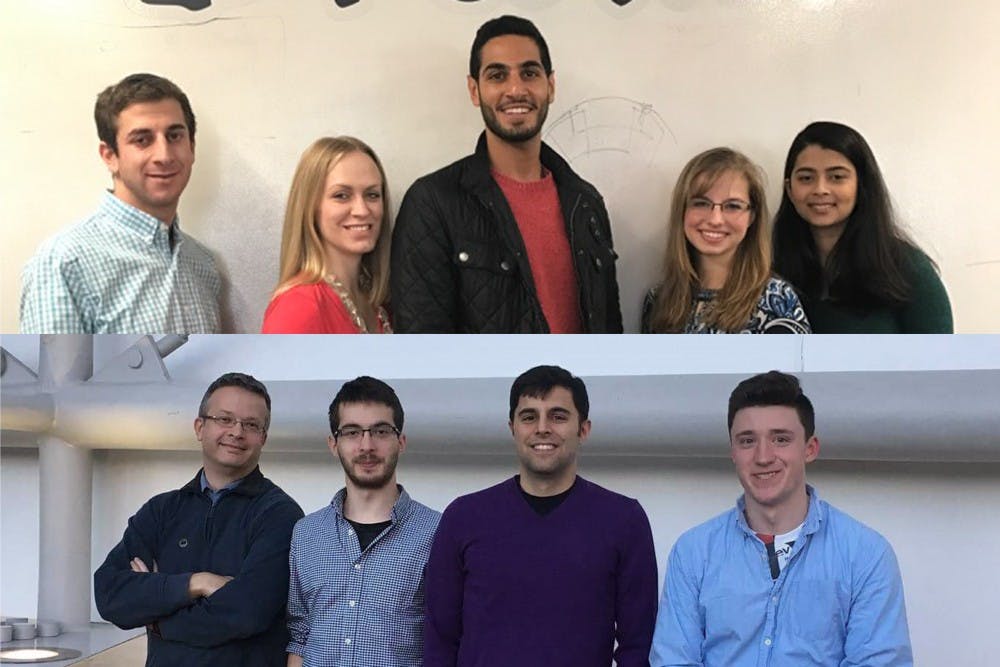
Photos from Group K Diagnostics (top: Eric Tepper, Amelia Keaton, Ghassan Kara, Brianna Wronko, Dayita Sharma) and RightAir (bottom: Marek Swodoba, Michal Swodoba, Jake Brenner, Thomas Uhler // Courtesy of Group K Diagnostics and RightAir)
Improving cancer drugs, helping patients with chronic diseases and increasing access to health care are just some of the aims of this year’s semi-finalists at the ongoing Penn Wharton Startup Challenge.
Participating groups compete for the grand prize of $30,000 and another $15,000 for legal and accounting services. These awards will be decided after finalist pitches and a startup showcase to be held at Huntsman Hall on April 28.
The competition saw an uptick in the number of non-Wharton contestants after changing its name from “Wharton Business Plan Competition” to “Penn Wharton Startup Challenge” in 2016, Associate Director at Penn Wharton Entrepreneurship Ann Miller said.
“We changed our name to Penn Wharton Entrepreneurship in order to show to the rest of Penn that we’re not just a Wharton resource, that we’re also a Penn resource,” Miller said.
College sophomore Niyathi Chakrapani is the team leader and CEO of Amsterdam Fluidics — one of 14 groups that progressed to the semi-finals, out of 112 that entered the competition. Her startup has improved cancer drug encapsulation technology, aiming to ensure that medication for cancer targets only cancerous cells, thus reducing the side-effects of treatment.
“What we do is we put this layer of lipids, or fatty substances, around drugs to make sure they only hit cancer cells,” Chakrapani said.
She added her company also aims to make the technology for cancer drug encapsulation more efficient.
“Johnson & Johnson had to shut down their operations because they couldn’t keep up with it. They took 17 machines to encapsulate a single batch of drugs,” Chakrapani said. “What we did is we actually created a little chip, a nano-technological chip, that has the same capability as [Johnson & Johnson’s] entire factory.”
College and Wharton sophomore Thomas Uhler is the team leader of Right Air, another semi-finalist company that has developed a product aiming to help patients suffering from chronic obstructive pulmonary disease.
“A typical cause [of the disease] would be smoking. A lot of mucus builds up there and they won’t be able to use their muscles as effectively to draw in air and take it out,” Uhler said. “What our device does is it goes over someone’s chest and attaches to their hip in the back. It basically takes the pressure off of their muscles which are exhausted near their lungs and makes it easier for the lower respiratory muscles.”
Engineering senior and team leader of Group K Diagnostics Brianna Wronkoalso hopes to address gaps in medical services. Her team is developing a diagnostic device that can test blood, urine and swab samples in the doctor’s office instead of sending them to a lab. The goal is to avoid the lag time of laboratory analysis.
Another participant, College and Wharton senior Sumun Khetpal, leads Ride Health, a company that works to improve care for patients facing logistical barriers by allowing health care providers to request transportation for patients.
“Twenty-five to 50 percent of no-shows [at the doctor’s] can be attributed to lack of transportation,” Khetpal said. “We want to show our community that we’re capable of merging Wharton and the medical school to solve this problem.”
Moving forward, the teams are looking to compete for funding grants and cultivate a network of investors and fellow entrepreneurs.
Uhler said he appreciates the opportunity to meet with judges as well as other students on campus who are “in the entrepreneurial space or just have that kind of mentality.”
“It’s good to meet those people and see what’s going on also because they have other friends that are doing similar competitions, and it can be a good way to lead to other pathways that can help a company really get the little extra push it needs to get there,” he said.
The Daily Pennsylvanian is an independent, student-run newspaper. Please consider making a donation to support the coverage that shapes the University. Your generosity ensures a future of strong journalism at Penn.
Donate




